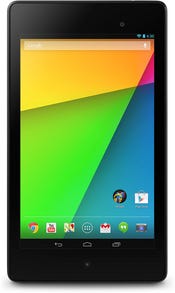Google, Intel Bring Haswell To ChromebooksGoogle, Intel Bring Haswell To Chromebooks
Asus and Toshiba are joining Acer and HP to make Haswell-based Chromebooks.


Google Nexus 7, Chromecast: Visual Tour
Google Nexus 7, Chromecast: Visual Tour (click image for larger view)
Google's Chromebook soon should be able to offer even better battery life and a wider variety of models to please its growing fan base.
At the Intel Developer Forum in San Francisco, Calif., on Wednesday, representatives from Google, Intel, Acer and HP showed off a new line of Chromebooks based Intel's Haswell processor family, noted for its power efficiency, not to mention its computational competency.
It was a Haswell-based Core i5 that helped double the battery life of the MacBook Air model launched by Apple in June. The forthcoming round of Chromebooks, which will cost much less than the MacBook Air, won't see quite as dramatic an improvement but the results will still be significant.
"The battery life on the new Chromebooks will be up to 50% better, and the trick is also doing that while delivering amazing levels of performance," said Navin Shenoy, VP of Intel's PC client group and general manager of the mobile platform division, in a press briefing. "And we'll see 15% or more improvement on performance using Haswell."
[ Where does Intel fit in the post-desktop world? Read Intel's Post-PC Strategy: 4 Takeaways. ]
That means Chromebooks should last for about nine to 10 hours on a single battery charge.
Google is gaining new hardware partners, too. Of the four hardware partners that have committed to bring Haswell-based Chromebooks to market, two are new: Asus and Toshiba.
The two hardware manufacturers join current Chromebook makers Acer, HP, Lenovo and Samsung. This growing stable of partners suggests demand for devices running Google's Chrome OS has created a meaningful market. Already this year, HP and Lenovo boarded the Chromebook bandwagon, in conjunction with retailers including Best Buy, Staples and Wal-Mart in the U.S.
Caesar Sengupta, product management director for Chromebooks, said Google began developing Chrome OS as a way to unify the multi-screen world through the cloud. Although Chromebooks did not sell well when they were introduced in 2011, they've become quite popular, particularly in the education market. "Over the last couple of years, we've seen very good traction," said Sengupta. "We've seen huge adoption in schools. Over 5,000 schools in the U.S. right now have deployed Chromebooks. That's roughly over 20% of the school districts in the U.S. and growing fast."
The emergence of Chrome OS as a viable third mainstream computing platform should worry both Microsoft and Apple. This isn't a long-shot challenge like Palm OS; it has the potential to alter the personal technology landscape.
Last October, Google senior VP Sundar Pichai was still talking about Chromebooks as devices that complemented computers running Microsoft Windows or Apple OS X. He characterized them as secondary devices. That is no longer the case. Google and its hardware partners see Chromebooks as primary computers.
What's changed? Sengupta points to the dynamism of Chrome OS, which receives updates and new features every six weeks. "The platform is evolving," he said, adding that users often take to Chromebooks unintentionally. "We regularly see cases where people have bought [a Chromebook] as an additional machine and end up spending almost all their time with us," he said.
Arif Maskatia, CTO of Acer, credits the ability to use Chromebooks offline, something that wasn't possible with first-generation Chromebook hardware.
Over the past year or so, Google has added offline capabilities to Chrome OS and to Google Apps. Just last week, it launched Chrome Web Apps, a way to package Web apps with the Chrome runtime so they can run outside of the Chrome browser, like native desktop apps. A distinguishing characteristic of Chrome Web Apps is that they function offline by default. Google's Web-centric operating system no longer needs to be connected to the Web.
Mike Nash, VP of product management for HP's consumer products division, said the perception of Chromebooks has changed, too. Where once customers might have seen them as low-cost netbook-like devices with limited capabilities, they now realize they're more functional and are showing interest in different form factors, he said.
HP's forthcoming Chromebooks exemplify that belief: They come in several vibrant colors, as does Apple's iPhone 5c, and will be marketed as lifestyle products rather than on the basis of price alone.
"We're definitely hearing from a subset of customers that they're interested in an alternate operating system and Chrome is addressing those needs," said Mike Nash, VP of product management in HP's consumer products division.
Google still has not offered any overall picture of Chromebook sales, but research firm NPD estimates that Chromebooks account for between 20% and 25% of the $300-or-less computer segment.
Amazon.com's list of best-selling laptops shows Samsung's third-generation Chromebook and Acer's C7 Chromebook currently in the number-one and -two positions. The Samsung Chromebook has spent 319 days in the top 100 of Amazon.com's list, which is as long as it has been available.
Gartner analyst Mikako Kitagawa said in an email interview that although recent sales figures won't be available until the end of the month, preliminary data suggests Chromebooks account for about 4% to 5% of the total mobile PC market.
"It goes down if you include desktops," she said. "The U.S. is the largest market for Chromebooks, but they're getting more traction in other countries. For segmentation, education is the largest buyer segment in the professional market."
About the Author
You May Also Like






